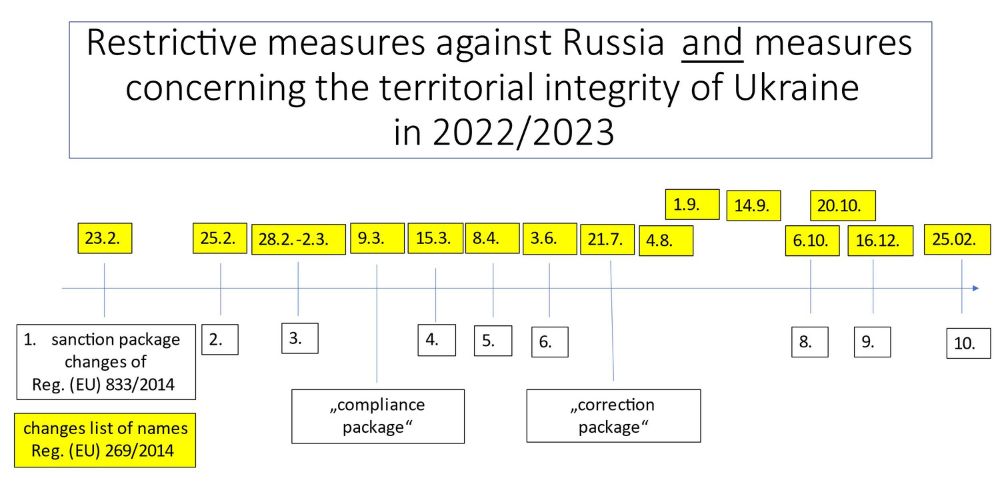Within just one year, since the beginning of the Russian war of aggression against Ukraine, the tenth package of sanctions against Russia was adopted on 25.2.2023.
Background to the tenth EU sanctions package
On the anniversary of Russia’s invasion of Ukraine and the ongoing war against Ukraine, the Council adopted a tenth package of sanctions. The measures include, broadly summarized, the following prohibitions:
- Prohibition of transit of listed dual-use goods through Russia with exceptions subject to authorisation (Art. 2 para. 1a, 3a, 4a)
- Prohibition of transit of firearms through Russia under Regulation (EU) No 258/2012 (Firearms Regulation) (Art. 2aa para. 1a)
- Prohibition for Russian nationals and residents to hold management positions in critical infrastructure companies in the EU (Art. 5o)
- Prohibition of the provision of storage capacity for natural gas to Russian nationals, residents or companies established in Russia (Art. 5p)
- Inclusion of additional items in Annex VII
- Inclusion of additional items in Annexes XI, XXI and XXIII and exemptions for legacy contracts for newly added items
- Inclusion of an exemption subject to authorisation for items listed in Annex XXIII for personal household use.
These items-related, as well as the other personal-related tightening of sanctions, were again implemented through amendments to the embargo regulations that have been in place since 2014. These are Regulation (EU) No 833/2014 on restrictive measures against Russia and Regulation (EU) No 269/2014 on measures concerning the territorial integrity of Ukraine. The latter regulation contains the list of names, persons, entities and bodies with whom no business may be done and whose assets are frozen. The list currently contains more than 1600 listings.
All EU sanctions packages and significant changes to the lists of names took place in a very short period of time in 2022/2023 parallel to the Russian escalation and thus require companies to carry out correspondingly short-term reviews of their business partners, products and, if necessary, the adjustments to their processes, as the following overview should illustrate.

Amendments to the aforementioned Regulations normally enter into force on the first day following their publication in the Official Journal of the EU. Purely personal amendments regularly enter into force even earlier, on the day of their publication in the Official Journal of the EU. As far as a prohibition is fulfilled and no so-called old contract clauses apply to previously concretely agreed transactions or other exceptions, the EU embargo is virtually “activated”. In the case of actual ignorance of a new prohibition in the event of a violation, there is only a short two-day grace period according to § 18 Abs. 11 of the Foreign Trade and Payments Act.
Against the background of these complex rules, it is important for companies to maintain a corresponding Internal Compliance Program (ICP) for EU embargoes – such as the Russia embargo in particular and also for export controls in general – permanently and according to their own risk. Otherwise, EU embargo rules may become potential obstacles.
II. Outlook
After ten EU sanctions packages within just one year, Russia is facing enormous economic pressure, which is also slowing down its war machine. However, pressure also creates counter-pressure and so it was only a matter of time before the issue of circumvention of EU sanctions would come into particular focus due to its increasing scope. According to the will of the German Minister of Economic Affairs, the next and eleventh EU sanctions package should therefore adopt measures which, above all, effectively and ideally prevent circumvention of EU sanctions right from the start. For example, it is planned to use EU customs data to screen for conspicuous flows of goods, as is allegedly already successfully practiced in Denmark. In addition, measures are being discussed and coordinated with EU partners that are intended to oblige further actors:
- For EU companies, this could lead to tightening of the issue of “transparent end-use declarations” by recipients in certain third countries.
- Companies in third countries that have actually participated in circumvention (once) should be able to be completely excluded from further business with sanctioned items. A possible listing of such persons is also being discussed.
- Third countries that do not cooperate with the EU with regard to EU sanctions against Russia should be able to lose EU customs advantages.
- In addition, there should be an “everyman’s obligation” for persons who have sanction-relevant information to report it to the EU sanction enforcement authorities.
Ten extensive EU sanctions packages and the already recognizable shadow of an eleventh EU sanctions package soon to come underline the necessity and importance of maintaining an ICP for a risk-based implementation of these challenges in the practice of companies.
